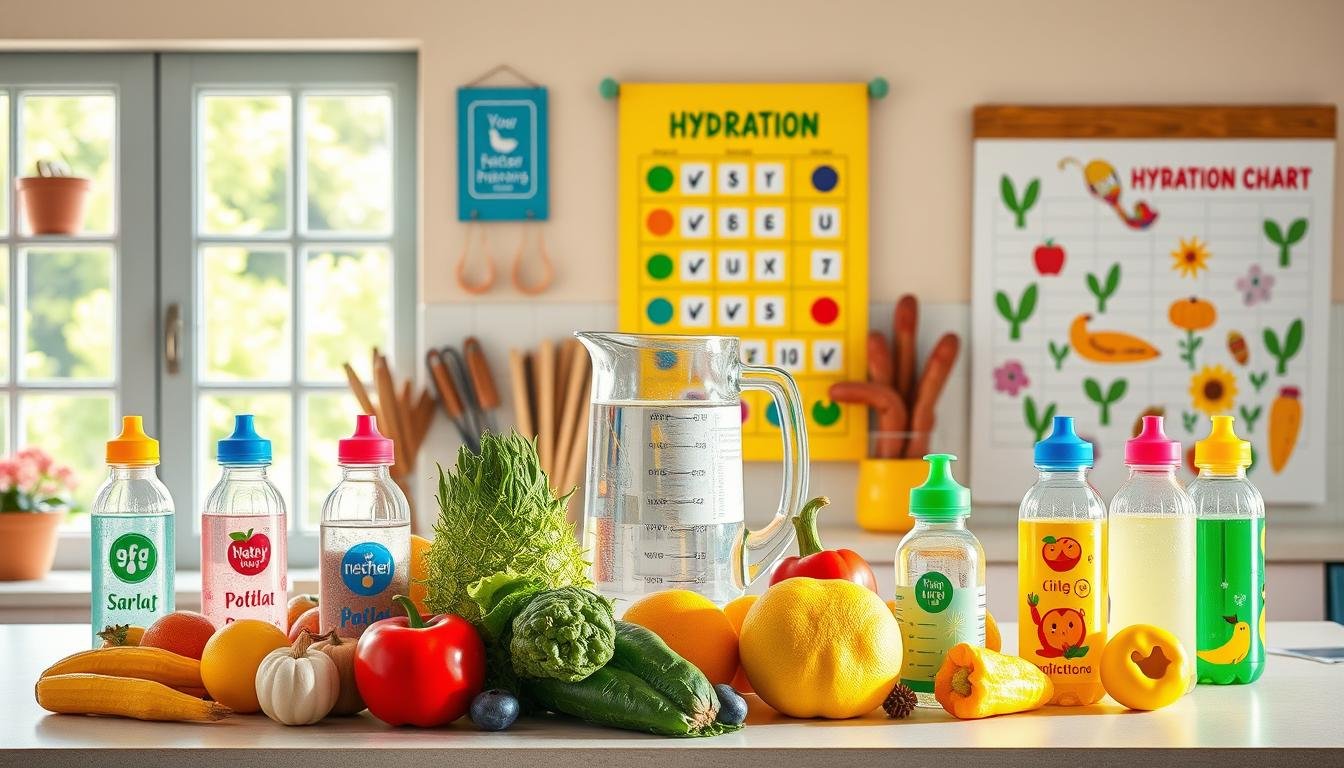Keeping your child hydrated is key for their health. Encouraging them to drink more water is a great way to do this. Drinking water with fluoride helps keep their teeth strong and healthy. Many tap waters have fluoride, making it easy to keep their teeth in top shape.
To make water more fun for your child, try using colorful straws or letting them pick their favorite bottles. This can make drinking water more enjoyable. You can also mix a bit of juice with water to make it taste better while still being mostly water.
By making water fun and easy to access, you can help your child develop good hydration habits. It’s all about finding creative ways to encourage them to drink more water. This will support their health and well-being for years to come.
The Importance of Hydration for Children
Water's Vital Role in a Child's Health
Keeping a child hydrated is key for their health and growth. The body, including a child’s, is mostly water. Water helps control body temperature, moves nutrients, and supports body functions. Encouraging kids to drink water boosts energy, focus, and brain work.
Dehydration is bad for kids. It can hurt their energy, school work, and health. Kids and babies get dehydrated easily because their bodies can’t keep fluids well.
Checking a child’s urine color is a good way to see if they’re drinking enough water. A little color means they’re hydrated. Yellow or dark urine means they need more water. Making water fun can help kids drink more and stay hydrated.
How much water kids need changes with age. Young kids (1-3 years) need 4 cups a day. Older kids (9-13 years) need 7 to 10 cups. Water intake can change with activity and weather. Drinking enough water is vital for kids’ health and brains, so it’s important to start early.
Signs and Symptoms of Dehydration in Kids
It’s important to know the signs of dehydration in kids. This can happen from vomiting, diarrhea, fever, or not drinking enough water. Mild dehydration symptoms include feeling thirsty, dizzy, or lightheaded. Kids might also have headaches, feel tired, or nauseous. They might also have dry lips, mouth, or throat.
As dehydration gets worse, symptoms get more serious. Severe dehydration signs include extreme thirst, feeling very tired, and being confused. Kids might also have pale skin, breathe fast, and have sunken eyes. In babies, a sunken fontanel (the soft spot on the head) is a sign of dehydration too.
- Dry mouth, lips, and tongue
- Reduced tears when crying
- Decreased urination or fewer wet diapers
- Sunken eyes
- Irritability or crankiness
Severe dehydration is very serious and can be dangerous. If your child has a lot of vomiting, is dizzy, or breathes fast, get help right away.
It’s key to prevent dehydration, which is more common when sick or in hot weather. Make sure your child drinks water often. Give them more fluids if they’re vomiting, have diarrhea, or a fever. Knowing the signs of dehydration helps you act fast to keep your child healthy and hydrated.
How to Encourage Your Child to Drink More Water
Keeping your child hydrated is key for their health. There are many ways to help them drink more water. Make sure they always have a water bottle nearby, even at school. Encourage them to drink water often, before, during, and after they’re active.
Keep a jug of cold water in the fridge for easy access on hot days. Add a lemon, lime, orange slice, or mint leaves to make water more fun. Freezing fruit in ice cubes can also make water more exciting. Let your child pick their favorite cups or bottles to drink from, which can make them more interested in drinking water.
It’s also important to drink water yourself. Kids often follow what they see their parents do. By drinking water regularly, you show your child the value of staying hydrated. This can help them develop a lifelong habit of drinking enough water.
Using these tips can help your child drink more water. It’s a creative and consistent way to get kids to drink more water, encourage water consumption in children, and boost water intake for kids. With a bit of effort, your child can stay hydrated and enjoy the benefits of drinking enough water.
Recommended Water Intake for Children
Keeping your child hydrated is key for their health. The amount of water they need changes with age and how active they are. Knowing these guidelines helps your child stay hydrated and grow well.
Age-Based Daily Water Requirements
Children’s water needs depend on their age, size, and how much they move. Here are the daily water intake guidelines for different ages:
- 1 to 3 years old: 4 cups (32 ounces) of water per day
- 4 to 8 years old: 5 cups (40 ounces) of water per day
- 9 to 13 years old: 7 to 8 cups (56 to 64 ounces) of water per day
- 14 to 18 years old: 8 to 11 cups (64 to 88 ounces) of water per day
Remember, these are general guidelines. A child’s water needs can change based on their activity, environment, and health. A simple way to think about it is for a child to drink half their weight (up to 100 pounds) in ounces each day.
Babies under 6 months get enough fluid from breast milk or formula. They don’t need extra water. But, after 6 months, you can give them small amounts of cooled, boiled water to help with their diet.
It’s vital for children to stay hydrated for their body and mind to grow. By following these water intake guidelines and encouraging your child to drink water all day, you support their health and well-being.
How to Encourage Your Child to Drink More Water
Keeping your child hydrated is key for their health and happiness. Here are some easy tips to help your child drink more water:
- Make sure your child always has a water bottle nearby, even at school. Tell them to drink water before, during, and after they play.
- Keep a jug of cold tap water in the fridge. It’s easy to grab on hot days.
- Drink lots of water yourself. Kids often do what they see their parents do.
- Make water fun by adding lemon, lime, or mint. Use fun ice cubes or let your child pick their favorite cups.
Give your child a colorful water bottle to make them excited about drinking water. Water should be the main drink, more so in hot weather or when they’re active. By making water fun, you help your child develop good habits that will last a lifetime.
Fluoridated Water: A Dental Health Benefit
Drinking water with fluoride is great for your child’s teeth. Many places have tap water with this mineral. Kids who drink it all day get fluoride in small amounts. This makes their teeth stronger and helps prevent cavities, offering big benefits of fluoridated water for children.
Fluoride is key for kids’ teeth. It can stop at least 25% of tooth decay, even with fluoride toothpaste. The CDC calls it one of the top health achievements of the 20th century.
Fluoride does more than just fight cavities. It also saves money for cities, with $38 saved for every $1 spent. Plus, it’s cheaper than a single dental filling per person.
Many health groups, like the CDC and the World Health Organization, support fluoride. After 75 years, it’s clear that fluoride is safe and effective for everyone’s teeth.
When to Offer Water to Infants and Toddlers
Keeping infants and young children hydrated is key for their health and growth. Babies under a year get enough fluids from breastmilk or formula. But, introducing water is good when they are 6 months old. It’s vital to know the right time and way to give water to them.
Hydration for Babies and Young Children
Babies have a lot of water in their bodies at birth, about 78%. By the time they are 1 year old, this drops to around 65%. The American Academy of Pediatrics suggests starting water for babies at 6 months. But, breastmilk or formula should still be their main drink until they are 1 year old.
For babies under 6 months, only breastmilk or formula is recommended. This is because these drinks give enough fluids and prevent problems like seizures. Dehydration signs in babies include less activity, fewer wet diapers, and dry mouth.
Toddlers need about 4 cups of liquid every day, including water and breastmilk or formula. Start teaching babies to use cups around 6 months. Use open or straw cups to help them learn to drink from a cup.
Tap water is usually safe for babies, but check its fluoride level. Low- or no-fluoride bottled water is good for mixing formula. Always give plain water to babies instead of flavored or sparkling water. This helps them get used to drinking plain water and avoids harmful additives.
By following these guidelines and watching your child’s hydration, you can help them stay healthy and grow well.
Hydration Strategies for Active Children
Keeping active kids hydrated is key for their health and sports performance. Kids who are active, and play in warm weather, risk dehydration. This can happen because of heat-retaining gear, not getting used to the heat, or health issues.
Signs of dehydration include thirst, dark urine, and feeling faint. Other signs are nausea, heavy sweating, and headaches. Cool skin, a weak heartbeat, muscle cramps, and tiredness are also signs. To stay hydrated, kids should eat salty snacks and foods with lots of water. They should also drink sports drinks before or after intense exercise. But, they should avoid energy drinks, soda, and coffee because they can dehydrate.
Hydration Tips for Athletic Children
- Drink water throughout the day, starting several hours before activity.
- Consume salty snacks and high-water content foods like fruits and vegetables.
- Use sports drinks to replenish electrolytes lost through sweating.
- Avoid caffeinated and sugary beverages that can lead to dehydration.
- Monitor urine color as a hydration indicator – pale yellow to clear is ideal.
- Seek medical attention if signs of severe dehydration, such as rapid breathing or confusion, occur.
By following these hydration tips for athletic children, parents and coaches can help keep active kids hydrated. This ensures they perform well and stay safe and healthy.
Conclusion
Keeping your child hydrated is key for their health and happiness. Make water fun and easy to drink. This helps them develop good habits for life.
Even a little dehydration can hurt a child’s performance and health. So, it’s important to watch how much water they drink. This supports their growth and development.
To get your kids to drink more water, try making it fun. You can add fruit to it or use a cool bottle. Also, drinking water at set times, like when they wake up or eat, can help make it a habit.
By focusing on your child’s hydration, you’re helping them succeed now and in the future. This is a great way to support their health and happiness.
Here’s a quick summary of tips to help your child stay hydrated:
- Fill a reusable water bottle when you go out.
- Drink water and milk with meals.
- Have a glass of water as soon as you wake up.
- Keep cold water in the fridge for easy access.
By following these simple steps, you can help your child stay hydrated. This is good for their body and mind as they grow.





